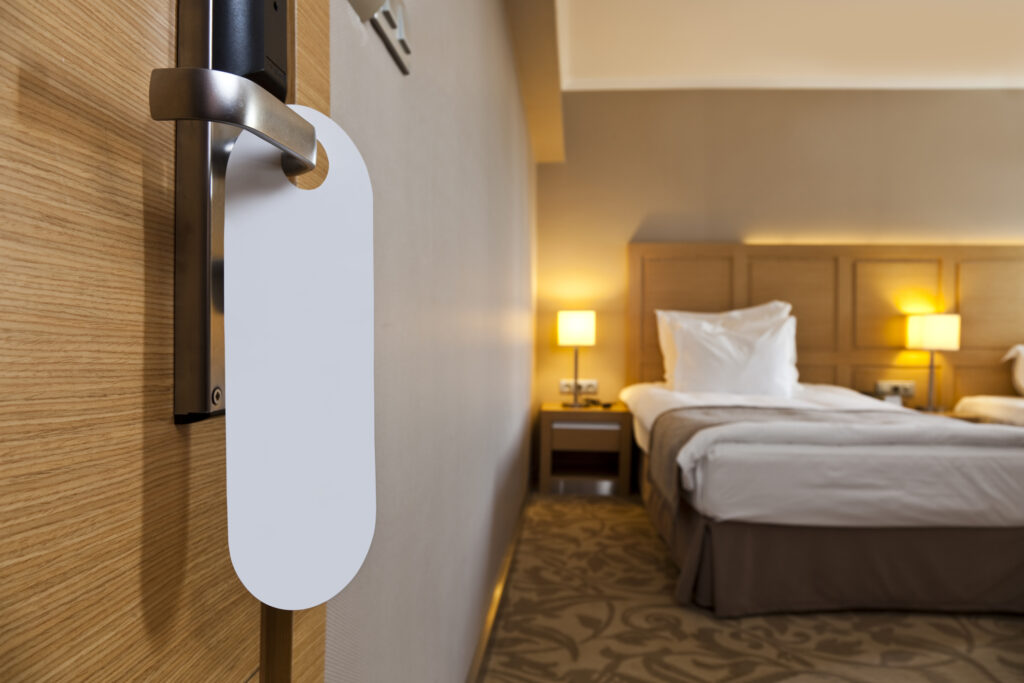Hotels versus motels — it’s an age-old question among travelers, especially in the United States. Many people imagine a motel as a dingy, run-down last resort option when you are dozing off at the wheel on a long road trip and just need a place to sleep for the night. That’s not necessarily the case (and believe me, there are plenty of hotels that fit this description as well). While it is true that the word “motel” derived from combining “motor” and “hotel” together, these establishments are often the most convenient and inexpensive option.
Here are some of the key differences between motels and hotels:
| Hotels | Motels | |
| Size | Large buildings with multiple floors and 100+ rooms | Smaller buildings with just one or two floors |
| Check-in process | Reception check-in area with 24/7 staff | Often you will access your room from the parking lot |
| Property Amenities | Restaurant, bar, fitness facilities, indoor/outdoor pool, room service, meeting rooms and conference center | Often there is a complimentary breakfast, shared laundry facilities |
| Cost | Typically starting around $175 per night | Typically ranging $45-$100 per night |
| Location | Within metropolitan areas, typically more walkable | Closer to highways and larger roads on the outskirts of town |
When should you book a motel?
Are you looking for a safe and convenient place to sleep when you’re on a cross country road trip? If you’re looking to stay close to the road so that you can easily get up and on your way the next day, a motel is the perfect option. Travelers that don’t need a lot of extra amenities and are focused on sleeping in a comfortable spot near the highway will find motels to be the right choice.
Are you traveling with your pets? Traveling with pets can be tricky, especially when it comes to strict hotel policies that don’t allow them on the property. If you’re in this boat, Motel 6 is a great option for those who are traveling with their dogs and looking for a safe, reliable place to sleep. The Motel 6 brand is dog-friendly and typically doesn’t require an additional pet fee.
Is price your main consideration? For those who are on a tighter budget, a motel is typically the less expensive option. Yes, you’ll be trading in some nice amenities for a less expensive room, but let’s be honest, are you really going to want to hit the gym at 10:30 pm after driving all day? If the answer is “no way,” you’ll probably be happy with your choice to stay at a motel.
When should you book a hotel?
Are you looking for a relaxing ambiance with plus amenities? For some travelers, the experience of staying in a nice hotel is one of the highlights of the trip. Hotels often have luxury spas, beautiful fitness facilities, world-class restaurants, and relaxing common spaces where you can lounge and share drinks with friends. If this is your jam, a hotel is the right spot for you.
Do you want to be in a more central area or desirable location? While motels are typically located closer to the highway, hotels are often located in more central locations where they are closer to restaurants and tourist attractions. This is beneficial for those travelers who are looking to spend time exploring the city that they are visiting. Look for a hotel in an area where you can walk around and take in the sites, shops, and restaurants in order to really get to know the city. Or opt for a smaller boutique hotel in a charming neighborhood where you can walk to local coffee shops in the morning and pretend like you are a local.
Will you be staying for more than a night or two? There are several hotels where you can reserve five nights for the amount of points that it would typically cost to reserve four, giving you a fifth night for free. So if you are looking at spending five or more nights in one place, it might make sense to see if you can get your fifth night for free!
Most popular hotel and motel brands
Recognizing the different name brand hotels and motels can help set your expectations about what the lodging might be like when you book a room.
Some of the most popular hotel brands include:
- Marriott
- Hilton
- Radisson
- Hyatt
- Four Seasons
- Sheraton
- St. Regis
- Westin
Popular motel brand options include:
- Econo Lodge
- Motel 6
- Super 8
- American’s Best Value Inn
- Red Roof Inn
- Days Inn
- Travelodge
Although these are some of the bigger names in the hotel and motel industry, there is a lot to be said for checking out smaller boutique lodging. Often, this is where you will find unique architecture, cool decor, and excellent hospitality.
Bottom Line
When it comes to looking for the right place to stay when you travel, it’s nice to have options. A hotel might be the right choice for someone who is looking to spend a few days in one spot and wants to be in a more central location that is closer to restaurants, bars, and attractions. A motel is a great option for those who are just looking for a safe, comfortable place to spend the night before they get back on the road again.
